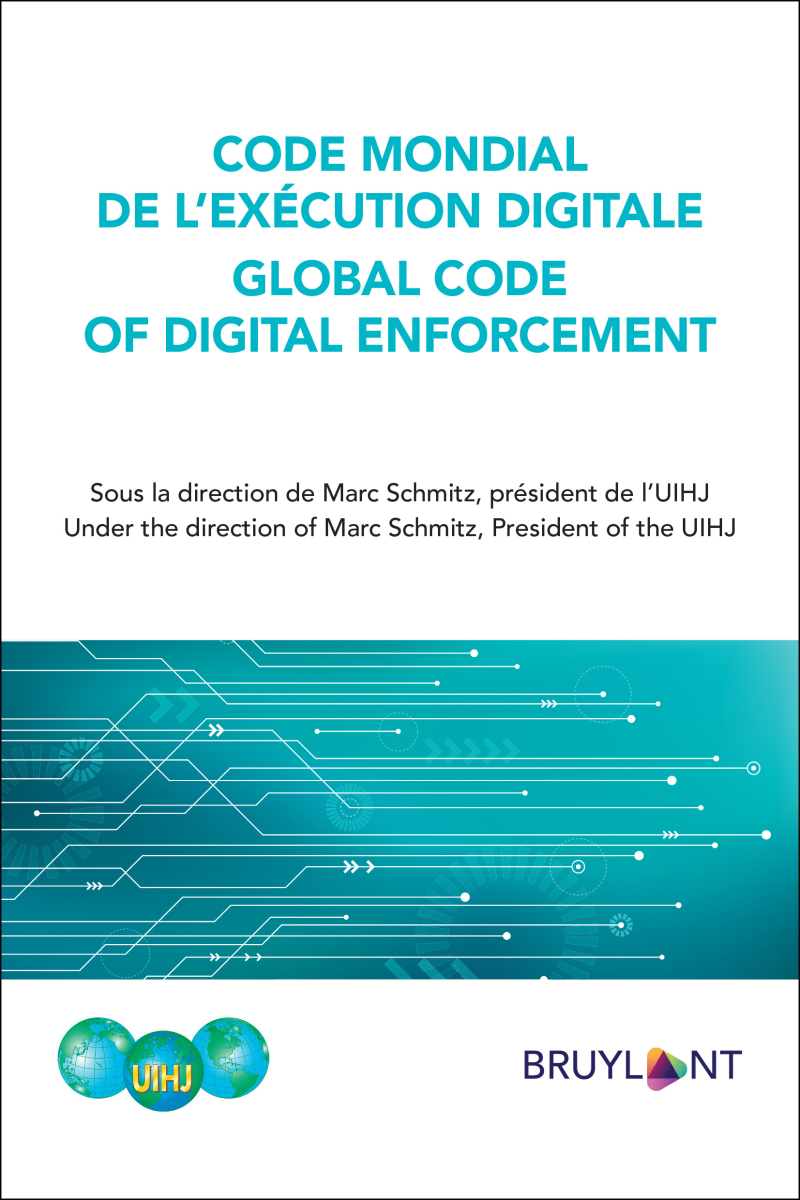 maestro
mastercard
visa
maestro
mastercard
visa

Code mondial de l'exécution digitale / Global Code of Digital Enforcement

L’Union internationale des huissiers de justice (UIHJ) a été créée en 1952. Elle regroupe une centaine de Chambre Nationales, associations professionnelles ou services publics d’exécution émanant de 5 continents. Elle a pour vocation de représenter ses membres auprès des organisations internationales et d’assurer la collaboration avec les organismes professionnels nationaux. Elle pourvoit à l’amélioration des droits procéduraux nationaux et des traités internationaux. Elle s’efforce de promouvoir les idées, les projets et les initiatives tendant au progrès et à l’élévation du statut indépendant de l’huissier de justice.
Dans un espace planétaire largement dominé par l’économie, il importe que les juristes remplissent leur rôle en renforçant la présence et le prestige de la justice. S’agissant du droit de l’exécution, l’UIHJ entend mettre à profit son expérience et son influence pour assurer l’effectivité de l’exécution des décisions de justice partout où cela sera possible.
Tous les trois ans, l’UIHJ organise un congrès international, lieu de grandes réflexions prospectives. Le thème du congrès de Washington DC (USA) en 2006, « L’harmonisation des procédures d’exécution dans un espace de justice sans frontières », a consacré la naissance du Code mondial de l’exécution, publié en 2015 à l’occasion des travaux du congrès international des huissiers de justice à Madrid (Espagne), fondant les bases d’une harmonisation universelle des règles d’exécution. Depuis, l’UIHJ travaille à la construction d’un ensemble normatif, pour fournir à tous les États des règles simples, efficaces pour permettre à tous les systèmes judiciaires d’utiliser un langage commun.
L’exécution digitale représente incontestablement aujourd’hui le plus grand défi auquel le monde doit fait face en matière d’exécution des décisions de justice. Le Code mondial de l’exécution digitale, destiné à s’intégrer au Code mondial de l’exécution, est le résultat du travail de l’UIHJ et du Conseil Scientifique dans ce domaine.
===============
The International Union of Judicial Officers (UIHJ) was established in 1952. It gathers about a hundred National Chambers, professional associations or public enforcement services from 5 continents. Its mission is to represent its members with respect to international organisations and to bring about cooperation with professional organizations at national level. It contributes to the improvement of national legal procedures and international agreements. It works to promote the ideas, projects and initiatives aimed at advancing and improving the independent status of the judicial officer.
In a world dominated by economic concerns, it is important that legal professionals play their role by strengthening the presence and prestige of justice. With respect to the legal field of enforcement, the UIHJ hopes to make its experience and influence available to ensure the effectiveness of the enforcement of judicial decisions wherever possible.
Every three years the UIHJ organises an international congress, which provides an occasion to reflect and discuss future developments. The theme of the Washington, DC (USA) congress in 2006, “The harmonisation of enforcement procedures in an area of justice without borders”, enshrined the birth of the Global Code of Enforcement. The Code was published in 2015 on the occasion the work of the international congress of judicial officers in Madrid (Spain), laying the foundations for universal harmonisation of the rules of enforcement. Since then, the UIHJ has been working on building a set of standards, to provide all States with simple, effective principles to allow all judicial systems to use a common language.
Digital enforcement is arguably the biggest challenge the world faces in the enforcement of court decisions today. The Global Code of Digital Enforcement, intended to integrate with the Global Code of Enforcement, is the result of the work of UIHJ and its Scientific Council within this area.
Digital version available on :
- Strada lex Belgium
- Strada lex Luxemburg
- Strada lex Europa
You have a subscription? Activate the digital version for free with the code in the book.
| Type of product | Book |
|---|---|
| Format | Paperback |
| EAN / ISSN | 9782802771029 / 9782802771258 |
| Weight | 138 g |
| Status | Available |
| Number of pages | 92 p. |
| Access to exercice | No |
| Publisher | Larcier |
| Language | English, French |
| Publication Date | Nov 17, 2021 |
| Available on Strada Belgique | Yes |
| Available on Strada Europe | Yes |
| Available on Strada Luxembourg | Yes |
Preamble: enforcement in the digital age
Part 1 – General principles of digital enforcement
Part 2 – Applicable law to enforcement
Part 3 – Principles specific to the activity of judicial officers or enforcement agents
Part 4 – Digital enforcement procedure
Part 5 – Enforcement against digital assets
Part 6 – Use of artificial intelligence in enforcement
Part 7 – Seizure of cryptoassets
Glossary
Relevant texts